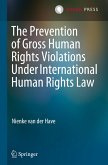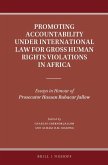The persistence of human rights violations around the world clearly demonstrates the need to focus more attention on preventive action. Consequently, international organizations are increasingly strengthening the preventive dimension of their human rights activities. Preventive mechanisms have also emerged and continue to gain ground at the national level. These new realities, however, seem to have received little attention by the academic community. Yet they raise many important issues, which need to be further explored. The above considerations prompted the Marangopoulos Foundation for Human Rights to mark its twentieth anniversary by organizing an International Colloquy on the topic of the prevention of human rights violations. The present Volume contains contributions by the participants, based on the reports they presented at the Colloquy, substantially revised and updated. It constitutes the first attempt at a systematic analysis of the subject of the prevention of human rights violations, focusing on the following five aspects: conventional regimes, non-conventional monitoring mechanisms, international commissioners and Ombudsmen, national Ombudsmen and human rights institutions and the development of a human rights culture. It closes with a theoretical synthesis of the various approaches to the prevention of human rights violations, focusing on the context, the concept and function, as well as methods and techniques of prevention.
Hinweis: Dieser Artikel kann nur an eine deutsche Lieferadresse ausgeliefert werden.
Hinweis: Dieser Artikel kann nur an eine deutsche Lieferadresse ausgeliefert werden.








